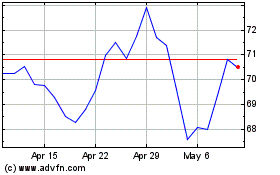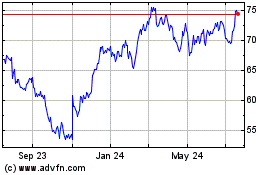Oil Tumbles on OPEC Skepticism
September 23 2016 - 3:20PM
Dow Jones News
Oil futures sank Friday on more skepticism that the world's
largest exporters are about to start cooperating and ease a supply
glut that has dragged down prices for two years.
Crude fell sharply just before noon after Bloomberg News
reported Saudi Arabia doesn't expect the Organization of the
Petroleum Exporting Countries to reach an agreement when it meets
later this month in Algeria's capital. The comments echo those made
last weekend by the group's secretary-general to Algeria's state
news agency APS that the meeting is informal and not for
"decision-making."
Traders "are reacting with disappointment and disgust," said
Donald Morton, senior vice president at Herbert J. Sims Co., who
runs an energy-trading desk.
U.S. crude for November delivery dropped $1.84, or 4%, to $44.48
a barrel on the New York Mercantile Exchange.
The losses erased two days of gains and a small, but positive
start to Friday's trade that had come as traders became more
optimistic about a deal. A Reuters report Friday morning said the
Saudi Arabian government is ready to cut its own oil output if the
Iranian government freezes its production levels.
But Saudi Arabian and Iranian oil officials also have clashed
this week over production limits while meeting at the OPEC
headquarters in Vienna, The Wall Street Journal reported later
Friday morning. Saudi Arabia and Iran couldn't agree on what
statistics should be used to determine oil output levels for a
potential "freeze"—the term used to describe a joint effort by big
producers to limit their petroleum output at the current pace or
lower.
Short bursts of optimism have often been broken by widespread
skepticism from analysts and traders about OPEC's ability to strike
a deal. Heavyweights including Saudi Arabia, Iran and Iraq have
longstanding political rivalries and have been stuck in a fierce
competition to undercut each other and sell more oil.
"Even an agreement to freeze would not be bullish either, given
how high current production levels are. The only bullish case would
be a credible and significant supply cut, which as it stands right
now is extremely unlikely," said Tamas Varga, an analyst at PVM Oil
Associates.
At 11 million barrels a day, Russian production levels are now
at their highest since the collapse of the Soviet Union, according
to Commerzbank commodities researchers. "The supply of crude oil
remains ample, in other words," the bank's analysts added in a note
Thursday.
Prices have often been bolstered by blasts of rhetoric from
major OPEC producers since late August when they broached the idea
of informal talks and better cooperation. Saudi Arabia and Russia
this month signed an oil-cooperation agreement. OPEC oil chief
Mohammed Barkindo last weekend said that if agreed by all parties,
an emergency meeting could be called later this year to solidify a
policy. Venezuelan President Nicolá s Maduro also has said OPEC and
non-OPEC members were close to a deal.
"There's a chance of success," said Robert Minter, investment
strategist at Aberdeen Asset Management, which had $402.8 billion
in assets under management at the end of June. "It would at least
show that they can once again act together and achieve a
consensus."
A senior OPEC official was quoted by The Wall Street Journal as
saying that OPEC has to keep the chatter going, "to make sure
prices don't fall to a certain level or rise to a certain level
they don't like, and recently we have seen a lot of that."
Summer Said and Benoit Faucon contributed to this article.
Write to Timothy Puko at tim.puko@wsj.com and Mike Bird at
Mike.Bird@wsj.com
(END) Dow Jones Newswires
September 23, 2016 15:05 ET (19:05 GMT)
Copyright (c) 2016 Dow Jones & Company, Inc.
Service (NYSE:SCI)
Historical Stock Chart
From Mar 2024 to Apr 2024

Service (NYSE:SCI)
Historical Stock Chart
From Apr 2023 to Apr 2024
